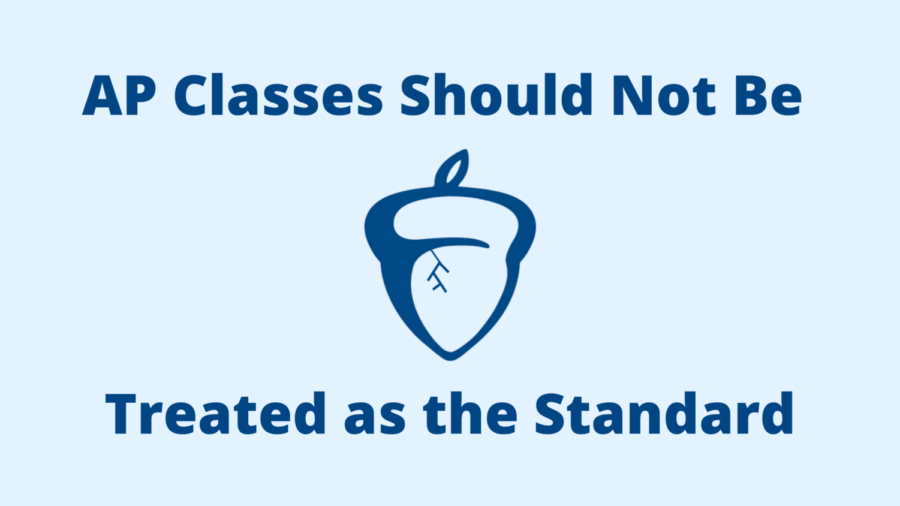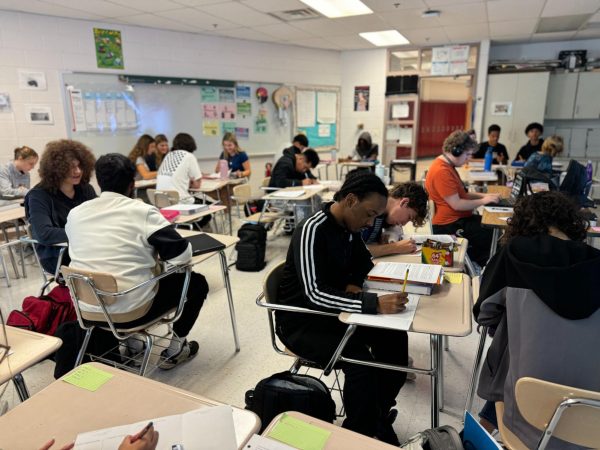To test or not to test is a question that many students ask themselves every year when taking an Advanced Placement (AP) course.
Hundreds of RHS students take AP exams every year, many of whom take more than one exam. According to staff development teacher Megan Pankiewicz, for the 2022 exam season, there are 525 students registered to take 621 exams as of Nov. 16. That’s an average of about 1.18 exams per student.
AP courses are a useful tool for students who are looking to receive college credit in high school, but a problem arises when the courses get treated as the standard, rather than an advanced option.
“AP classes are supposed to be college-level classes,” AP English Language and Composition teacher Krista McKim said, “I think sometimes, nationally, we forget that it’s an accelerated course.”
Rather than placing emphasis on taking higher-level courses, the focus should be placed on making sure students are taking classes at the appropriate level for them, and that those classes are receiving the attention they need to ensure that students succeed.
“We need to get rid of this stigma, that on-level is bad,” McKim continued, “there’s nothing wrong with taking an on-level course, and then making sure that on-level courses are appropriately challenged, for whatever the level is at.”
While the College Board is providing a good service for students, it also has a lot of control over the market for ways to earn college credit during high school, which is a lot of power. It sometimes chooses to use this power in ways that are inconsiderate of the students it serves.
In 2019, the College Board raised fees for late registration and exam cancellation from $15 to $40. In addition, The College Board moved the registration deadline from March to November, simultaneously shortening the decision window and raising the stakes.
“I believe that $40 is too steep a price to pay for a student that either changes their mind after the College Board deadline, or simply forgot, and wants to register for their exam after November 15th,” Pankiewicz said.
The College Board raised fees to cover the cost of additional learning resources, which it did deliver on, but the burden of those resources should not have necessarily fallen so heavily on students.
Students still had the option to skip exams that year, make sure they paid on time, or not register for an exam unless they were very sure they would be taking it. There were ways around the extra fees, even if they were unfair. In the spring of 2020, exams were modified due to the COVID-19 pandemic, something no student could control, and the College Board did not refund students for the exams that they did pay for.
When students register and pay for an AP exam, they make an agreement to get the experience they paid for. When the College Board was not able to uphold its end of the agreement during the 2020 exam season, it should have fully refunded the students who had paid for their exams.
Even in years prior to 2020, some believed that receiving a failing grade on an AP exam was equivalent to wasting the $94 exam fee, and the time they spent in class, and preparing for the exam.
When a student fails their exam, it’s not necessarily throwing away $94, as they still sat for the exam and received a score for the work they did. There is still value in learning how to sit for a long exam and pace oneself, even if that experience doesn’t come with earning college credit.
On a surface level, the AP Program is a beneficial tool for students to take accelerated courses and receive college credit at a lower cost than in a college setting; but the way that the classes are treated culturally, and the way students have been treated financially, indicates that there is room for improvement.
AP classes are a valuable resource for students, not just academically, but as a way for students to get the feel for a faster paced class, with the high school support system still in place.
“Part of the value was earning the college credit, but another, less explicit, and less tangible value, was just learning how to learn,” Pankiewicz said.

This is junior Malaak McDonald’s second year working with the Rampage and her first year as Production Head. She enjoys writing features and is looking...












